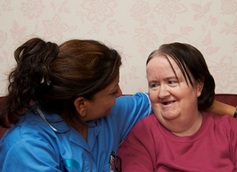Hospitals and emergency services 'not coping' with mental health patients
Access to mental health services throughout England needs to improve, according to The College of Social Work.

Findings from a recent study of Approved Mental Health Professional (AMHP) lead officers recorded accounts of adults with mental health conditions being unable to access specialised services and support, the consequences often leading to bed blocking in accident and emergency units, as well as unnecessarily long detentions in police cells.
Sometimes the only option open to AMHPs is to detain individuals under the Mental Health Act if informal voluntary admissions are not available.
As well as causing knock-on problems for other public services, research also finds delays to be a serious risk to the well-being of patients, and potentially to those in contact with them – most likely to be either loved ones or care professionals.
Dr Ruth Allen, chair of The College of Social Work’s mental health faculty, comments:
“This survey shows that mental health crises are not being treated on a par with other acute health crises. Waiting long times for ambulances, waiting in police cells and not being offered an alternative to being detained under the Mental Health Act are all signs of a system that is not coping and cannot protect people’s rights effectively. This sometimes leaves AMHPs in intolerable situations, struggling to discharge their statutory functions.
“Taken with the national data showing year on year increases in detention rates, the survey shows we are not doing enough to prevent crises, respond well when they do happen and support service users and their families in the community.”
The findings were drawn from more than 100 AMHP leads who responded to a survey by the College, with more than 80 per cent having experience of hospital admissions being delayed and 41 per cent reporting they had encountered such issues on more than five occasions.

Other concerns reported include the availability of police and ambulance support, suggesting that the emergency services are unsure to what extent mental health related enquiries need to be prioritised. While there also exists a habit to place patients in hospitals far from their locality.
The report comes in the same week that the Equality and Human Rights Commission (EHRC) has published new guidance from a United Nations Committee on human rights in relation to care and social services.
The EHRC remind local authorities of their legal obligation to prioritise ‘non-discrimination, safeguarding and personalisation’, throughout all services, without vulnerable adults being excluded from the effectiveness of their practice.
Stephen Bowen, Director of the British Institute of Human Rights, welcomed the guidance, commenting:
“[The] guidance is vital to ensuring almost half a million older people who get care in their own home receive the full protection of the Human Rights Act.”
“As the guidance points out, putting human rights at the heart of commissioning enables authorities to harness their purchasing power to drive up quality and ensure that home care users, often in vulnerable situations, receive dignified care.”

Further advise is available from Skills for Care, who have published a ‘workforce strategy’ –‘Supporting staff with challenging behaviour’ – to guide care sector employers on decision-making in relation to adults who are defined as ‘challenging’.
Chief executive Sharon Allen says of the guide: “It was critical that this guide supported workers to have a clear understanding of the needs of people who can challenge services and their support networks so that, as one person told us, we are ‘putting my disability second and seeing me a human being first’. The guide is full of practical advice so staff have the confidence and skills to make sure that people who may challenge services are not adversely impacted in their aspirations to live independently as part of their local community.”
Rob Grief, chief executive of the National Development Team for Inclusion, who collaborated on the guide, added: “This partnership has helped us to develop a personalised strategic approach that recognises the need to have skilled workers who understand how to support people who may challenge. Each of the sections in the guide offer supporting resources that will make a real difference in how challenging situations can be resolved effectively.”
The guide which can be viewed at: http://www.skillsforcare.org.uk/challengingbehaviour/ is ‘aimed at adult social care employers and commissioners working specifically with adults with a range of support and care needs such as older people with conditions across the dementia spectrum, people with mental health and personality conditions, and those with learning disabilities who have particularly complex needs and/or are labelled as challenging services. The guide will help employers with developing competency and expertise in providing support to people who challenge, across different groups’.
Latest News Analysis
 04-Sep-19
Extra £1.5 billion announced for social care in Chancellor's Spending Review
04-Sep-19
Extra £1.5 billion announced for social care in Chancellor's Spending Review
 17-Jul-19
Flexible Working Bill for all jobs gets MPs approval - delighting parents, disabled and carers
17-Jul-19
Flexible Working Bill for all jobs gets MPs approval - delighting parents, disabled and carers
 18-Jun-19
Overnight care workers forced to sleep in offices and told 'bring your own bedding'
18-Jun-19
Overnight care workers forced to sleep in offices and told 'bring your own bedding'
 11-Jun-19
PM candidates on social care: Rory Stewart calls fixing care an 'unfinished revolution'
11-Jun-19
PM candidates on social care: Rory Stewart calls fixing care an 'unfinished revolution'
 05-Mar-19
Amber Rudd announces scrapping of controversial PIP payment review for pensioners
05-Mar-19
Amber Rudd announces scrapping of controversial PIP payment review for pensioners